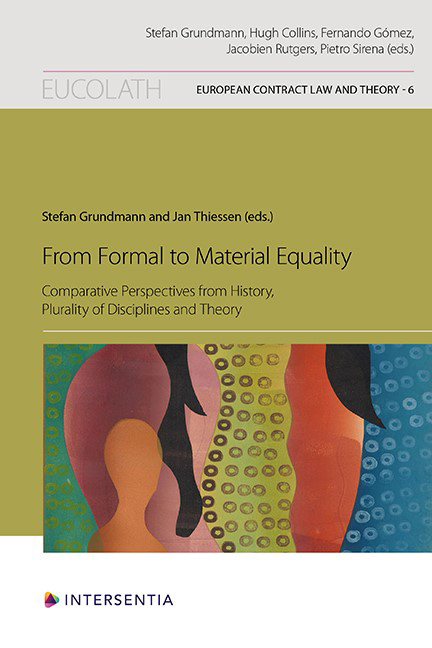 From Formal to Material Equality
From Formal to Material Equality Published online by Cambridge University Press: 15 November 2023
DIFFERENT APPROACHES TO EQUALITY IN LAW
EQUALITY AS A QUESTION OF JUSTICE – FIRST APPROACH
When thinking about “equality”, one almost inevitably falls into the footsteps of Aristotle, who distinguished between similarity – related to a quality – and equality, related to a quantity. Equality, in turn, was a central concept for his doctrine of justice, especially for his conception of an arithmetical equality in the iustitia commutativa.
However, I am more interested here in equality of status, which, following Aristotle ‘ s systematics, should rather be placed with iustitia distributiva, if not with justice in the general sense. However, Aristotle did not accept equality of status.
1.2. A HOPEFUL ENCOUNTER – SECOND APPROACH
Th e greatest conceivable legal inequality manifests itself in slavery. Th ere, the legal personhood of individuals, or a group of people, is simply denied and the person is degraded to a mere thing: the human being is legally degenerated to the status of a thing. The problem of justice that lies therein concerns the unequal treatment of members of the human species who are actually equally qualified. In antiquity, especially in Christianity, people were already sensitive to this, without, of course, drawing any legal conclusions from it. The letter of the apostle Paul to Philemon speaks of Onesimus, a (perhaps runaway) house slave. Paul sends him back to his master, the addressee of the letter. But Onesimus comes back to Philemon as a brother because of baptism, Paul writes:
I am appealing to you for a child of mine, whose father I became while wearing these chains: I mean Onesimus. … I am sending him back to you – that is to say, sending you my own heart. … I suppose you have been deprived of Onesimus for a time, merely so that you could have him back for ever, no longer as a slave, but something much better than a slave, a dear brother; especially dear to me, but how much more to you, both on the natural plane and in the Lord.
To save this book to your Kindle, first ensure no-reply@cambridge.org is added to your Approved Personal Document E-mail List under your Personal Document Settings on the Manage Your Content and Devices page of your Amazon account. Then enter the ‘name’ part of your Kindle email address below. Find out more about saving to your Kindle.
Note you can select to save to either the @free.kindle.com or @kindle.com variations. ‘@free.kindle.com’ emails are free but can only be saved to your device when it is connected to wi-fi. ‘@kindle.com’ emails can be delivered even when you are not connected to wi-fi, but note that service fees apply.
Find out more about the Kindle Personal Document Service.
To save content items to your account, please confirm that you agree to abide by our usage policies. If this is the first time you use this feature, you will be asked to authorise Cambridge Core to connect with your account. Find out more about saving content to Dropbox.
To save content items to your account, please confirm that you agree to abide by our usage policies. If this is the first time you use this feature, you will be asked to authorise Cambridge Core to connect with your account. Find out more about saving content to Google Drive.